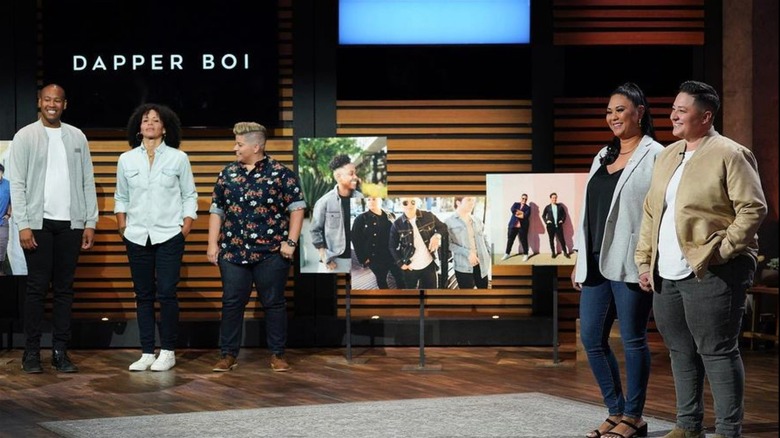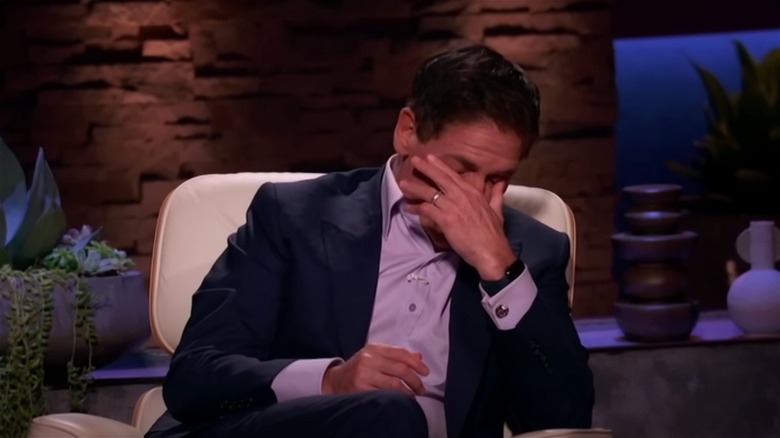What Happened To Dapper Boi After Shark Tank?
It's pretty easy to sketch out an invention on a bar napkin or plan to start a business with your college buddies. Without the proper funding and industry experience, however, putting dreams into action can prove nearly impossible. That's where the Sharks come in. Lori Greiner, Mark Cuban, Kevin O'Leary, and other high-powered investors have been supporting fresh-faced entrepreneurs on ABC for over a decade. Over the years, "Shark Tank's" most successful products have included Scrub Daddy and Bombas Socks. They're both worth millions. Dapper Boi, too, has found considerable success since appearing on the show in April 2023.
The San Diego-based brand, which seeks to provide gender-neutral clothing for all body types, was founded by Charisse and Vicky Pasche in 2015. "[The brand is] bigger than us. ... It's people feeling confident in themselves," Vicky told The San Diego Union-Tribune in 2023. According to the co-founder, she always struggled to find clothes that fit her in the men's section, and the women's aisles rarely carried what she was looking for -– Dapper Boi is a comfort-driven, genderless solution. In 2015, Charisse and Vicky launched a successful Kickstarter campaign. "I got the confidence to keep going with this because there were so many people within the community that had the same problem that I did," said Vicky. As their business continued growing, "Shark Tank" seemed like a great way to sign on an investor and promote the brand on national TV.
The Sharks didn't bite on Dapper Boi
Charisse and Vicky Pasche went on Season 14 of "Shark Tank" to pitch Dapper Boi. They asked for $250,000 in return for a 5% equity. As Vicky quickly pointed out, the business has earned about 3.5 million in sales since launching in 2015. Although they find selling direct-to-consumer works best for them, they're not opposed to incorporating third-party vendors in the future. As the Pasches explained to the Sharks, they use a pre-order strategy to motivate customers. What's more, a Dapper Boi shirt costs about $9.40 to produce — the retail price is $60. Meanwhile, jeans are sold for $99 and cost $15 to make, and 51% of shoppers come back for more. Suffice it to say their brand already had a loyal fan base before "Shark Tank."
That being said, they were still struggling financially — in fact, they were about $450,000 in debt. "I will admit here, COVID killed us," said Vicky, adding, "We just sold our house." After their post-pandemic struggles came to light, the Sharks expressed skepticism. "Guys, something doesn't add up for me," said Mark Cuban, wondering how the brand could have lost so much money given their impressive margins. Daymond John said he'd mentor the Pasches, although he wasn't comfortable financing them. Lori Greiner and Kevin O'Leary both said, "I'm out," and Dapper Boi didn't have what Barbara Corcoran looks for in a business either. "The clothes are secondary," Mark Cuban told the couple, explaining that they should take a community-driven approach.
Dapper Boi has thrived without the help of a big-name investor
Although Dapper Boi didn't get the $250,000 it was looking for on "Shark Tank," that hasn't stopped the business from growing in popularity. Their website is clearly thriving, offering everything from their trademark genderless jeans to "Rocky"-esque hoodie robes. "We believe changing your clothes can change your life," explains the site, advertising a Dapper Boi app that gives customers 10% off when they download. Dapper Boi also has over 40,000 followers on Instagram, and, unlike many defunct "Shark Tank" brands, the account is still active.
In June 2023, Dapper Boi released a promotional video, also sharing their post "Shark Tank" game plan. "Since our appearance on 'Shark Tank' back in April, we've been doing a lot of self-reflection. We've been forced to grapple with critiques," the caption read, adding that two common criticisms "don't sit well" with them. For starters, Dapper Boi doesn't agree that it's "just another clothing company." They also don't think they should have to stay in their LGBTQ+ niche, as Daymond John seemed to imply on the show. "We are all people, beyond labels and categories," they explained, adding, "The cultural biases that divide us impact each of us individually, and they shape entire industries." Now, Dapper Boi is hoping to return to its "lighthearted roots."

